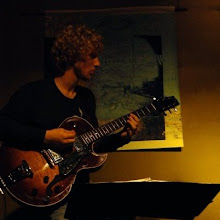
Christian McBride was born on May 31, 1972 in Philadelphia. Electric bass was Christian's first instrument, which he began playing at age 9, followed by acoustic bass two years later. His first mentors on the instrument were his father, Lee Smith (a renowned bassist in Philly) and his great uncle, Howard Cooper (a disciple of the jazz avant-garde).
While intensely studying classical music, Christian's love for jazz also blossomed. Upon his 1989 graduation from Philadelphia's fertile High School for the Creative and Performing Arts (C.A.P.A.), Christian was awarded a partial scholarship to attend the world-renowned Juilliard School in New York City to study with the legendary bassist, Homer Mensch. That summer, before making the move to the Big Apple, the already in-demand bassist got his first taste of touring, going to Europe with the Philadelphia Youth Orchestra, and traveling the U.S. with the classical jazz fusion group, Free Flight.
McBride never had a chance to settle into his Juilliard studies. Within the first two weeks of the semester, he joined saxophonist Bobby Watson's band, Horizon. He also started working around New York at clubs such as Bradley's and the Village Gate with John Hicks, Kenny Barron, Larry Willis and Gary Bartz. After one year at Juilliard, McBride made a critical decision to leave school to tour with trumpeter Roy Hargrove's first band, electing "experience with as many musicians as possible" as the best teacher. In August of 1990, he landed a coveted position in trumpeter Freddie Hubbard's band, which lasted until January of 1993.
In 1991, legendary bassist Ray Brown invited the young wunderkind to join him and John Clayton in the trio SuperBass. After being hailed “Hot Jazz Artist” of 1992 by Rolling Stone, Christian continued to prove it as a member of guitarist Pat Metheny's "Special Quartet," which included drum master Billy Higgins and saxophonist Joshua Redman. While recording and touring with Redman the following year, McBride signed to Verve Records in the summer of 1994, recording his first CD as a leader, Gettin' to It. He also graced the big screen playing bass in director Robert Altman's 1940's period piece, Kansas City (1996).
Christian recorded three more career-shaping albums at Verve: Number Two Express (1996), the soul-jazz fusion project A Family Affair (1998 – featuring Christian’s first two songs as a lyricist), and the critically acclaimed SCI-FI (2000), marking the inaugural execution of Christian’s concept of music being boundless by genre. The following year, he continued to expand his audience with two endeavors. He dipped into hip hop with a side project dubbed The Philadelphia Experiment, a “jam band”-inspired CD that reunited Christian with his high school friend, drummer Ahmir “?uestlove” Thompson (leader of The Roots) and featured keyboardist Uri Caine and guitarist Pat Martino.
Later that year, pop star Sting invited Christian to become a key figure in his 2001 All This Time CD, DVD and tour. Then in 2002, Christian supported George Duke by becoming a member of his band and recording on his landmark album Face the Music: the legendary keyboardist’s first album on his own recording label, BPM. “Christian is a monster on that bass,” Duke states with pride. “It isn’t often these days to find a young musician so dedicated to his craft. Christian is my kind of musician, one that is open to new ideas, good at playing different styles, reads music prolifically and is dedicated to furthering the growth of music not only as a musician, but as a young representative of his profession. There isn’t anyone better. And besides that, he’s a great cat!”
There have been very few artists who truly embody the genuine, heart-felt passion for music in all areas as has Christian McBride. By boldly continuing to leave his mark in areas of musical performance, composition, education and advocacy, he is destined to be a force in music for decades to come.


No comments:
Post a Comment